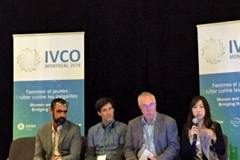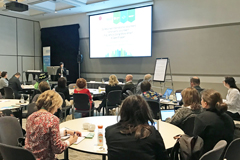What Can Volunteer Programs Accomplish for Inclusive Development? JICA-RI Research Results Shared at IVCO 2018
2018.12.18
The 2018 International Volunteer Cooperation Organisations’ Conference (IVCO) was held in Montreal, Canada from October 28 to 31, 2018. Mayuko Onuki, research fellow at JICA Research Institute (JICA-RI) presented her research findings at the event.
IVCO is a conference hosted once a year by the International Forum for Volunteering in Development, a meeting place for international volunteer groups from different countries to share knowledge and case studies. This year’s theme was “Women and Youth: Bridging the Gap — Volunteering for Inclusive Development.” Some 200 people from 29 countries participated in discussions regarding inclusiveness in volunteer projects — mainly what volunteer projects can do to help women and young people overcome inequality they face.
Various sessions and panel discussions took place on the sub-theme “From Policies to Practice” on the 29th, and JICA-RI staff member Eriko Sakamaki served as moderator for dialog session 2, “Inclusive Development: Where are we at?” This session focused on the key term “intersectionality,” and the point was raised that each variable of human individuals — gender, age, language, ethnicity, and culture — affects one another, and hence, it requires not only simply addressing each variable individually but also a comprehensive approach to solving the problems that individuals encounter.

JICA-RI staff member Eriko Sakamaki served as moderator (far right)
Then, on the 31st, Onuki took the stage for dialog session 13, “Communicating Impacts via Civil Engagement,” which dealt with the sub-theme “Communicating Impacts Strategically.” Presenting under the title “Do Returned International Volunteers Continue to Volunteer? If So, Who Is Doing More What? A Case of Japan,” Onuki delivered the results from a JICA-RI research project, “Contributions of International Volunteers in Bringing Change to Developing Countries and Shaping a Global Civil Society.” Given the attention paid to the role of international volunteers in solving development issues and the role they play domestically upon returning to their home country, this project was initiated for the purpose of considering the impact of JICA’s volunteer program, one of Asia’s leading international volunteer programs, on the beneficial effects that their efforts have within Japan.
As part of this research, Onuki analyzed the results of a survey of former Japan Overseas Cooperation Volunteers (JOCV) members and former senior volunteers roughly 10 years after returning to Japan, 228 people in total, regarding the fields and number of days spent in volunteer activities over the past year. The results showed that, when those activities were compared with the volunteering tendencies of the general public, returned volunteers continued to be more active in volunteer activities. Among returned volunteers, participation was particularly high among women in environmental fields, and among men in local community-related fields. Moreover, Onuki explained that although it is thought that volunteer activities are generally born out of altruistic motives, in Japan, they tend to be rooted in a spirit of reciprocity and indebtedness, and that there is a tendency for people who seek personal growth, stimulation, and enjoyment to continue volunteering in areas related to international cooperation. Onuki emphasized that when the promotion of international volunteer activities is considered, one needs to pay attention to a set of values that view personal and societal changes positively and place expectations in what can be obtained by giving. Questions from the floor included JICA’s efforts to allow experienced volunteers to continue engaging in social contribution activities and what kinds of policy recommendations could be made on the basis of this research.

JICA-RI Research Fellow Mayuko Onuki presented her research results on volunteers activities
Additionally, during dialog session 14 titled “Communicating Impacts by the Multiplication of Inclusive Practices” held on the 31st, Akihisa Tanaka, director of Strategy and Program Operation Division at the JOCV secretariat, went on stage to introduce a case study in which the participation of girls and disabled children had been effectively encouraged in a Sports Day arranged by JOCVs at a Senegalese elementary school.
Through such presentations, participation in IVCO proved to be an opportunity for providing information from Japan and sharing issues related to inclusive development with international volunteer project members from different countries.

事業事前評価表(地球規模課題対応国際科学技術協力(SATREPS)).国際協力機構 地球環境部 . 防災第一チーム. 1.案件名.国 名: フィリピン共和国.

事業事前評価表(地球規模課題対応国際科学技術協力(SATREPS)).国際協力機構 地球環境部 . 防災第一チーム. 1.案件名.国 名: フィリピン共和国.

事業事前評価表(地球規模課題対応国際科学技術協力(SATREPS)).国際協力機構 地球環境部 . 防災第一チーム. 1.案件名.国 名: フィリピン共和国.

事業事前評価表(地球規模課題対応国際科学技術協力(SATREPS)).国際協力機構 地球環境部 . 防災第一チーム. 1.案件名.国 名: フィリピン共和国.

事業事前評価表(地球規模課題対応国際科学技術協力(SATREPS)).国際協力機構 地球環境部 . 防災第一チーム. 1.案件名.国 名: フィリピン共和国.
scroll